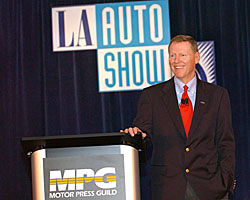by Robert Musial

Ford CEO Alan Mulally at LA Auto Show.
LOS ANGELES, Nov. 15, 2007—Ford Motor Company is committed to producing a full range of fuel-efficient vehicles that emit fewer greenhouse gases, without compromising customers' choices for interior room, performance or safety, Ford president and CEO Alan Mulally said Wednesday at the Los Angeles Auto Show.
"We are focusing on sustainable technology solutions that can be used not for hundreds or thousands of cars—but for millions of cars, because that's how we can truly make a difference," he said during a keynote address that kicked off press preview days at the West Coast show. The public show, at the Los Angeles Convention Center, runs Nov. 16-23.
In his address, Mulally told the Motor Press Guild that the near-term cornerstone of the company's plan will be a new generation of fuel-saving, turbo-charged, direct-injection gasoline engines in Ford's lighter, high-volume cars and trucks.
The first of these engines, which offer the performance of a V-8 with the fuel economy of a V-6, will appear in the new Lincoln MKS luxury sedan, which debuted on the auto show floor a few minutes after Mulally ended his remarks.
"We are going to keep improving the fuel efficiency of all our vehicles from this day forward, forever," said Mulally. "It's important to start this discussion and keep it going. We need to do this right now."
During the next five years, Ford expects to introduce a range of gasoline turbo-charged direct-injection four- and six-cylinder engines in a significant number of its global vehicles. The new family of engines will save customers between 10 and 20 percent on their fuel costs without compromising performance.
The company will further detail these engine plans in January at the North American International Auto Show in Detroit.
Mulally also pledged that half of Ford's U.S. new vehicles will be capable of running on alternative fuels by 2012.
In Europe, in addition to the Focus and the C-MAX which are already flex-fuel capable, the new Mondeo, the S-MAX and the Galaxy will be offered as flex-fueled versions, beginning early next year. In Brazil, flex-fuel vehicles already account for 72 percent of Ford's volume and in Asia, Ford is leading in the introduction of flexible-fuel vehicles.
For the mid- and long-term, Ford will improve the aerodynamics of its cars and trucks, reduce their weight by 250 to 750 pounds each through the use of aluminum and high-strength steel and introduce fuel-saving, twin-clutch transmissions and electric power-assisted steering. The company will also add more hybrid vehicles and diesel engines on its light-duty vehicles.
Reducing weight allows the use of smaller engines which in turn leads to lighter chassis and suspension parts and further weight reductions, which helps increase fuel economy.
"The best part? We can do this for millions of customers and give them the high-quality products they want," said Mulally.
The company will also continue to aggressively develop plug-in hybrid and hydrogen fuel cell technology for future vehicles, he said.
Next month, Ford delivers the first Escape Hybrid plug-in to Southern California Edison as part of a partnership to explore how such vehicles would work in the marketplace.
Ford currently has a fleet of 30 hydrogen-powered Ford Focus fuel cell cars on the road as part of a worldwide, seven-city program to test such cars in real world conditions. The fleet has logged more than 600,000 miles already. The company is also testing 24 hydrogen-fueled shuttle buses in use across Canada and the U.S.

